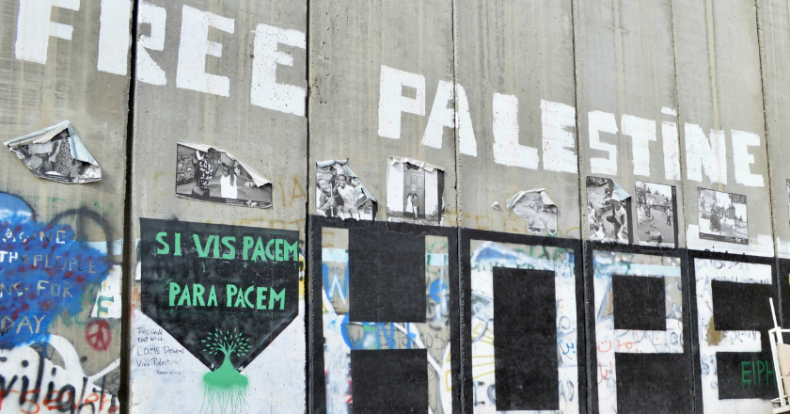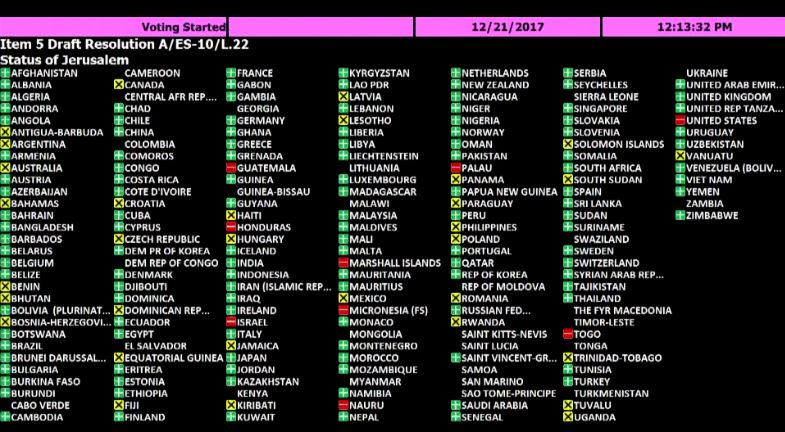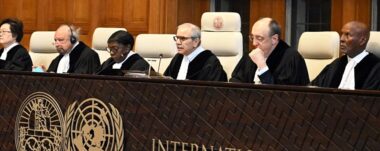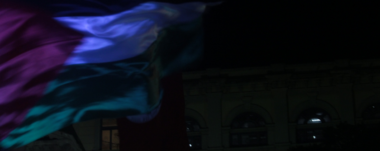U.S. Veto Of Palestine At The UN: Thoughts

Original title: “The veto of the United States to the admission of Palestine as a Member State of the United Nations: some reflections”. Text written by Professor Nicolás Boeglin, from the Law School of the University of Costa Rica.
Last April 18, the United States vetoed a draft resolution calling for recommending Palestine as a Member State to the United Nations General Assembly (see official statement from the United Nations).
Regarding the admission of Palestine, the draft resolution, submitted by Algeria, quite simply, was limited to two simple sentences only (see text).
The simplicity of the text responds to the fact that it is a procedure used each time a state entity applies to become a Member State of the United Nations.
The last time this procedure was used was to incorporate South Sudan in this capacity in 2011: an initial recommendation by the Security Council to the General Assembly was followed by a resolution of the latter voted in favor of the integration as a new Member State in the United Nations of South Sudan (see General Assembly resolution A7Res/65/308 of August 25, 2011).
Recorded Vote In Brief
In the case of the draft resolution recommending by the Security Council the admission of Palestine, and voted on April 18, the recorded vote was as follows: 12 votes in favor, one against (United States) and two abstentions (Switzerland and United Kingdom).
For Latin America, Ecuador and Guyana voted in favor.
In Asia, it is noteworthy that Japan and South Korea did not succumb to intense U.S. pressure and also voted in favor of the draft resolution.
Somehow the U.S. leadership in the world continues to decline and the dramatic situation in Gaza since the afternoon/evening of October 7, 2023, contributes greatly to this.
U.S. veto to Palestine UN
Once the U.S. veto was made public in the Security Council, several States officially expressed their regret at this new setback in the long and tedious process of Palestinian membership in the United Nations: see in this regard, among many, the official communiqué of Bolivia, of Chile, or from Mexico, or the official communiqué released by the diplomatic apparatus of United Arab Emiratesand of Norway. Mexican diplomacy insisted again in an official communiqué released last April 25 (see text).
U.S. veto to Palestine UN
Other States sent to New York the head of their diplomacy to support the pro-Palestinian effort, personally addressing the same Security Council a few hours before the April 18 vote (see intervention by the Brazilian Foreign Minister, as well as intervention by the Colombian Foreign Minister in charge and official communiqué by the Colombian diplomatic apparatus).
The intervention of the head of Spanish diplomacy (see text) before the Security Council on April 18 augurs well for an early recognition by Spain of Palestine as a state, which could well be followed by other member states of the European Union (EU). Recently, it was read by a former Israeli diplomat in a publication in Spain that:
“El reconocimiento internacional del Estado de Palestina y su incorporación como miembro de pleno derecho de la ONU deben preceder a un eventual proceso de paz con Israel y ser independientes de su éxito o fracaso. Los dos protagonistas de las negociaciones deben gozar del mismo reconocimiento internacional” (Nota 1).
The intervention of the head of Spanish diplomacy (see text) before the Security Council on April 18 augurs well for an early recognition by Spain of Palestine as a state, which could well be followed by other member states of the European Union (EU). Recently, it was read by a former Israeli diplomat in a publication in Spain that:
Brief Background
On April 2, the State of Palestine initiated the procedure for its admission by sending a formal request to the Secretary-General referring to its desire to reactivate its request for admission as a Member State: this is a similar initiative made in 2011, which the Security Council has not acted upon since then (see text of the letter of April 2, 2024 and formal application of September 2011).
U.S. veto to Palestine UN
It can be considered that, at least in part, Palestine’s motivation to resume with this long-standing unresolved request was due to the profound annoyance caused by the top U.S. representative when the Security Council adopted Resolution 2728 on March 25, 2024: in the explanation of the U.S. vote (an abstention), she surprised many of her counterparts inside the Security Council (and many more outside. ..) by referring to the “non biding” character of this resolution (Note 3).
U.S. veto to Palestine UN
A Security Council resolution demanding a cease-fire in Gaza, adopted after three abortive attempts due to three US vetoes … non-binding? How so? As it reads. This unusual position of the top U.S. representative at the United Nations headquarters in New York evidenced the degree of creativity to which U.S. diplomats are reaching in order to protect Israel in Gaza. A renowned Chilean jurist did not hesitate to describe the U.S. position as a true “leguleyada” (Note 4). Last April 26, 2024, an academic published an article responding to a previous one which insinuated – rather questionably, based on erroneous data – that the U.S. position has some basis in the practice of the Security Council (Note 5).
U.S. veto to Palestine UN
Faced with the wave of widespread repudiation caused, and the confirmation by the International Court of Justice (ICJ) of new provisional measures against Israel adopted on March 28 (as ignored by Israel as those already ordered on January 26, 2024), the Palestinian authorities opted to reactivate the admission process pending since 2011. After a first request formally submitted on April 2 to the UN Secretary General, consultations were initiated at the highest level: on April 9, it was the Arab Group at the United Nations, the Non-Aligned Movement and the Organization of Islamic Cooperation (OIC) that jointly endorsed Palestine’s application for admission as a UN Member State (see letter collective letter).
On April 15, 2024, a brief report by the UN Admission Committee noted the reservations of one State without naming it in particular (see report).
U.S. veto to Palestine UN
Recently, a leaked confidential diplomatic cable (see cable) revealed the type of pressure exerted by the United States on the diplomatic authorities of Ecuador, in view of the vote on this same draft resolution within the Security Council. As a detail of interest – apparently ignored by some – Ecuador formally recognizes Palestine as a State since December 24, 2010 (see note from the BBC).
Presumably, other members of the Security Council received very similar pressures: their effect was quite limited, considering that Ecuador, as well as 11 other States, voted in favor of the text, confirming the aforementioned loss of leadership.
Scope Of The U.S. Veto
This new solitary veto by the United States in the Security Council on April 18 confirms the total isolation of the United States, which the unspeakable drama in Gaza since the afternoon/evening of October 7 further reinforces, given the unconditional American support for Israel, while the abstentions of the United Kingdom and Switzerland raise two very valid questions.
It is very likely that in the face of this (new) veto, some States will choose to submit a draft resolution to the United Nations General Assembly this time (193 Member States), in order to further highlight the isolated position of States and Israel.
A few years ago, it proceeded in this way when in a solitary manner, on December 19, 2017, on the occasion of a text proposed by Egypt condemning the transfer of embassies to the city of Jerusalem (see link to document S/2017/1060), the recorded vote was 14 votes in favor and a single vote against (United States): see minutes S/PV.8139 (page 3).
U.S. veto to Palestine UN
For this new exercise in the UN General Assembly, the United States and Israel will be able to count on the hard core of the “coalition” that usually accompanies the United States and Israel within the General Assembly in this type of contests, namely: Canada, Marshall Islands, Micronesia, Palau, Palau, Nauru, which could be joined by the unrecognizable Argentina as of December 2023, as well as some state in Central America.
Regarding the resolution condemning embassy relocations to Jerusalem by the General Assembly, the vote recorded on December 21, 2017 (see UN press release) yielded the following numbers: 128 votes in favor, 35 abstentions, 9 votes against (the aforementioned “coalition” was joined by Guatemala, Honduras and Togo while Canada dissociated itself with an abstention) and with 26 delegations opting for the “No Show“. The voting board of December 21, 2017 is reproduced below:

U.S. veto to Palestine UN
It is worth noting that the sad spectacle of US diplomacy in the Security Council with a vote of 14 votes in favor and a single US veto should not be understood as a monopoly of the (also sad …) administration of President Trump. This same U.S. diplomatic failure was observed at the Security Council session of February 18, 2011, when a resolution vehemently condemning the illegal Israeli colonization in occupied Palestinian territory was proposed: see in this regard meeting minutes S/PV/6484 (page 3). In her explanation of vote on February 18, 2011, the U.S. Representative found nothing but to note the following (page 5):
Si bien coincidimos con nuestros colegas miembros del Consejo, y de hecho, con el mundo entero, en cuanto a la insensatez y la ilegitimidad de la continuación de las actividades de asentamiento de Israel, consideramos que es poco prudente que el Consejo intente resolver las cuestiones fundamentales que dividen a israelíes y palestinos (sic.).
Recognition Of Palestine As A State
Beyond Israel’s repeated exactions on Palestinian territory that U.S. diplomacy has lent itself to protect, using its veto power in the Security Council, of the current 193 UN Member States, 140 already recognize Palestine as a state and maintain official state-to-state relations with the Palestinian authorities.
In Latin America, Panama stands out (in its own way) as the only state that does not yet formally recognize Palestine as a state: since August 2014, its authorities “evaluate” the possibility of recognizing Palestine as a state (see note from the August 2014 Panama Star).
U.S. veto to Palestine UN
It should be recalled that the recognition of Palestine as a State by Costa Rica in February 2008 reactivated support for Palestine as a State in Latin America and other parts of the world. Following Costa Rica’s recognition, Latin America responded to this call by making a similar gesture in favor of Palestine. In chronological order, these were Venezuela (April 2009), Dominican Republic (July 2009), Bolivia, Brazil, Ecuador and Paraguay (December 2010), Peru and Chile (January 2011), Argentina (February 2011), Uruguay (March 2011), El Salvador and Honduras (August 2011), as well as Guatemala (April 2013). In August 2018, Colombia proceeded to recognize Palestine as a State, being the last State to have done so in the Latin American region. Outside the region, it is striking that, just after Costa Rica, Lebanon recognized Palestine as a State in November 2008 and Syria did so later, in July 2011.
Since November 2012, the United Nations General Assembly has granted Palestine the status of “Non-Member Observer State“: this status has enabled Palestine to sign and ratify a large number of international treaties under the auspices of the United Nations, including the Rome Statute of 1998 creating the International Criminal Court (ICC). In case of doubts and fallacious pseudo-arguments (which are never lacking …) on the point of knowing whether, from a legal point of view, a non-member State of the United Nations has this legal capacity, it suffices to recall that Switzerland was not a member of the United Nations until September 10, 2002.
The United States In The Face Of Israel’s Senselessness In Gaza
The US veto on April 18, 2024 will probably be remembered as a serious error of judgment by US diplomacy: an abstention would have allowed the text to pass, as happened last March 25 with regard to a resolution demanding a cease-fire in Gaza (a binding resolution, despite the unusual US declarations). Domestically, it would have lowered the tension on American university campuses: by vetoing the admission of Palestine to the United Nations, the United States exacerbated even more the spirits of the student body and teachers already strongly mobilized on various American university campuses (see this extensive report published in Israel in Magazine+972). Recently, in view of the police repression carried out in several university campuses in recent days, the United Nations Special Rapporteur on the Rights of the Palestinian People expressed in her social networks (see link):
What lessons are Western universities and governments imparting to their young citizens and students when they attack the very values and rights that are said to be foundational to Western societies?
U.S. veto to Palestine UN
In turn, this serious U.S. diplomatic blunder will most likely incite some States that have not yet done so to recognize Palestine as a State: Barbados announced it 48 hours after this veto (see note from Caribbean News), Jamaica announced it on April 22 (see official communiqué), and other States should take the same decision in the coming weeks, as a sign of profound rejection of the U.S. decision.
For their part, the Palestinian authorities may decide to assess this US veto as yet another whim of Israel to which the US diplomatic apparatus lends itself, and take the decisions they deem most appropriate: in recent months, Israel has lost all credibility and even its closest allies within American society and in some parts of Europe are distancing themselves from the current Israeli authorities.
U.S. veto to Palestine UN
A recent joint communiqué by UN experts – very sparsely reported and referenced in the mainstream international press – denounces the deliberate destruction of the existing fragile educational and university network, as well as the deliberate dstruction of cultural and historical heritage in Gaza (see official communiqué from the United Nations on April 18), and points out that:
“These attacks are not isolated incidents. They present a systematic pattern of violence aimed at dismantling the very foundation of Palestinian society,” the experts said“.
To the limited dissemination of this type of information in the international media and in the U.S. and European press, we must add another element evidenced in recent days: the recent efforts of the New York Times to avoid the use of certain words in articles by its journalists when writing about the drama being experienced in Gaza (see article in this regard of April 15 in The Intercept,whose reading is recommended). These efforts highlight the kind of relays that pro-Israel circles have in the mainstream media in the United States (and most likely in other news outlets in other latitudes).
U.S. veto to Palestine UN
We can also recommend reading this article published in Truthout, entitled “Israel Has Formed a Task Force to Carry Out Covert Campaigns at US Universities” on the network that Israel has maintained in American universities in order to curb and stigmatize displays of sympathy and solidarity with Palestine by American students and faculty. In this regard, it is worth asking whether this type of network was only intended for American universities, or whether it also extends to other academic centers in various parts of the world.
Dragged along by Israel, the unconditional US support since the afternoon/evening of October 7 contributes to undermine much of the credibility of the United States in various parts of the world: reasonable doubts are (and will be) raised every time its representatives invoke in the future the defense of the rules in force in the international legal order and of the values and principles that sustain them.
U.S. veto to Palestine UN
Moreover, the abstentions of the United Kingdom (predictable) and Switzerland (surprising) now threaten to have a very similar effect, particularly for the United Kingdom, which continues to supply Israel with arms, as do the United States and Germany. This is despite the enormous amount of information corroborated by the United Nations on Israel’s use of them against the Palestinian civilian population in Gaza.
It should be noted that since the evening / night of October 7, 2023, the Israeli military offensive in Gaza has failed to achieve a single one of the military objectives that were invoked to justify it: the top leaders of the Hamas military wing in Gaza continue to send instructions to their subordinates, the Hamas military capability continues to resist with handcrafted rockets sent into Israel with some frequency from Gaza and attacks on Israeli military (already totaling 259 killed and 1582 wounded as of April 19, 2024), while the Israeli citizens captured by Hamas on October 7 remain in hiding somewhere in Gaza with their custodians. The latest UN report available (as of April 19, 2024) refers, as of October 7, 2023, to more than 34,000 people killed in Gaza and nearly 77,000 injured.
U.S. veto to Palestine UN
Given the resounding failure of this Israeli military operation, Israel’s attempt to divert media and international pressure to other scenarios in the Middle East is more than notorious. We had the opportunity to warn about it since March, as well as several other analysts: see video of activity held at UCR on March 13, 2024, entitled “History and misinformation: critical perspectives on the Gaza-Israel conflict“, min. 1:43:30 and video of this other activity organized by the Tecnológico de Costa Rica (TEC) in Cartago on March 19, 2024 entitled “Gaza /Israel: since when does an attack, no matter how violent, justify a genocide“.
The academy and its spaces in the face of questionable treatment by the Costa Rican press
Still on academic matters, it was recently read that the Rector of the UCR declined an invitation from the highest representative of Israel in Costa Rica (see note of the Semanario Universidad titled “Rectoría rechaza reunión con Embajada de Israel hasta que no haya cese al fuego” del 14 de marzo del 2024). Less than a month later, the UCR Rectory indicated substantially limiting contacts with the Israeli Embassy (see note of April 10, 2024). No similar decisions have been made public coming from other rectors of public (or private) universities and it is not known if they were the subject of similar demarches by Israel’s representatives in Costa Rica. Nor is there any known fact that has suddenly motivated the Embassy of Israel in Costa Rica to extend a special invitation to the Rector of the UCR.
U.S. veto to Palestine UN
We can observe that, unlike many other Costa Rican universities, the UCR has offered various spaces to discuss the situation in Gaza, one of them being the aforementioned forum entitled “History and disinformation: critical perspectives on the Gaza-Israel conflict” (see video activity). Another activity took place last March 22 (see program) and will continue next April 29. A radio program such as Desayunos de Radio Universidad (UCR) recently offered a morning program in its April 19 edition (see link) that is recommended listening (and whose content, barring error on our part, has not been similarly replicated in other Costa Rican university radio media since October 7, 2023).
Probably in no other portal of a Costa Rican university will you read an article like the one recently published in the UCR portal (see text published on April 22, 2024 and titled “The Arab-Israeli conflict in historical perspective“), which concludes that:
U.S. veto to Palestine UN
Es urgente la presión internacional para detener lo antes posible esta demencial barbarie y lograr sentarse a negociar por verdaderos acuerdos de paz que también incluyan el respeto a los Derechos Humanos y la justicia política y social.
On November 17, 2023, the UCR organized a forum with intellectuals, in particular renowned Costa Rican poets, entitled “Stop the genocide in Gaza! Poetry and critical reflection” (see video).
The UCR portal, in its section called Expert Voice also allowed us to release from October 2023 a text (see link) entitled: “Hamas attack from Gaza and the “total siege” of Gaza announced as Israeli response. Some notes from a public international law perspective“.
U.S. veto to Palestine UN
The questions we can ask ourselves are the following, after referencing some of the many informative spaces and activities organized since October 2023: why has the UCR opened spaces for discussion on the drama being experienced in Gaza and why have other Costa Rican universities been so cautious about it? What are the images, articles, opinions, reports on Gaza that have been circulating since October 7, 2023 that do motivate an academic unit to organize a space for reflection within the UCR and that, apparently, do not seem to be known by university students in other Costa Rican universities?
With respect to information, and to Costa Rican information professionals, the treatment of information on the drama being experienced in Gaza, there are many aspects that can be analyzed and many more questions that can be raised. Since there is practically no space for self-criticism within the Costa Rican journalistic profession, the academic units that train future information professionals in Costa Rica could focus on breaking down the semantic game to which several media outlets have lent themselves since October 7 in Costa Rica, as well as many other media outlets in other parts of the world.
U.S. veto to Palestine UN
The absence of condemnation of the deliberate killing of Palestinian journalists in Gaza since October 7 by Israeli military forces is another question mark that persists over time. Recently, during the official presentation of awards inside the majestic National Theater to the young and talented team of communicators of the series “Broken Plates” of the UCR (see link to the first four chapters), its members made clear the heavy silence of the guild of communicators about what journalists live in Gaza: see note from the Semanario Universidad titled “‘Alto al asesinato a periodistas’ piden ganadores con el premio de periodismo“.
As of April 23, 97 journalists have been intentionally and deliberately killed in Gaza by Israel (see report of the Committee to Protect Journalists as of April 23). In this regard, it is quite striking the exchange of letters and finally the letter made public by the Red de Solidaridad con Palestina – Costa Rica collective to the Colegio de Periodistas de Costa Rica (COLPER), entitled (see text) “No se mata la verdad matando periodistas” in which it reads that:
U.S. veto to Palestine UN
Como detalle revelador de la respuesta a nuestra acción, es que en ningún momento se nombra a Palestina ni a su pueblo que viene sufriendo un exterminio sistemático, transmitido en tiempo real por las propias víctimas.
La respuesta del Colper está dirigida a la compañera que firma por la Red de Solidaridad con Palestina, sin usar el nombre de la organización, sin usar siquiera el nombre del pueblo víctima ni el lugar de sus hechos. Podría interpretarse cual, si fuera parte de un breve intercambio epistolar entre una persona cualquiera y el Colegio, sobre un tema trivial cualquiera, al que no se concede la menor importancia, cuando realmente es una crisis en Derechos Humanos y Derecho Internacional donde es cercenado el derecho a la libertad de prensa, libertad de expresión y el derecho a la comunicación e información de la sociedad costarricense.
This April 26, 2024, it was reported on the official demarche carried out by Lebanon before the international criminal justice for several cases of journalists and reporters killed on the border with Israel, widely documented (see note by Human Rights Watch): both in relation to the 97 journalists killed in Gaza and to the information professionals killed on Lebanese territory by Israel, COLPER persists in its silence.
Israel’s Diversion Of Media Attention: A Recent Example
Beyond the absences of the Costa Rican journalists’ guild, usually very quick to react when freedom of the press is threatened or attacked in other parts of Latin America (and of some newsrooms that also condemn with great vehemence the threats, intimidations or deaths of journalists in Latin America), the diversion of media attention as a strategy of Israel was recently verified: this occurred when, hours before the reading of the first ICJ order in The Hague on January 26, 2024, Israel released accusations against a dozen officials of the United Nations Relief and Works Agency for Palestine Refugees in Palestine (UNRWA) on the basis of an “intelligence report“, accusing them of having collaborated with Hamas on October 7.
As of this writing (April 26), Norway, unlike other states, has kept its funding to UNRWA intact, pending “strong evidence” provided by Israel to suspend its contribution to UNRWA (see press release from Al Mayadeen). Just this April 22, 2024, a UN report concluding an investigation into the allegations launched by Israel against UNRWA personnel (see text of the report as such) states that Israel has provided no evidence to support them as it reads (page 22) that:
U.S. veto to Palestine UN
The Israeli Ministry of Foreign Affairs informed that until March 2024, they had received staff lists without identification (ID) numbers. On the basis of the March 2024 list, which contained staff ID numbers, Israel made public claims that a significant number of UNRWA employees are members of terrorist organizations. However, Israel has yet to provide supporting evidence of this.
We refer the reader to some of the first press releases referring to the absence of evidence provided by Israel (see note from The Guardian) as well as to this official United Nations press release. Ten hours after The Guardian, the U.S. media outlet New York Times also issued a note to that effect.
The absence of evidence provided by Israel to the members of the UN investigative body in almost three months of the accusations made against UNRWA staff should only be seen as the confirmation of a communication operation of the Israeli state apparatus, in view of the order read by the ICJ on January 26, 2024.
Last April 24, 2024, Germany announced that it was resuming its contribution to UNRWA (see official press release and note from The Guardian), which it had suspended following the accusations launched by Israel.
In Conclusion: Israel’s Folly In Gaza In The Face Of International Justice
Despite Israel’s diversionary strategy (which should no longer be a major shock) and the U.S. veto noted on April 18, pressure from the international community will continue to be exerted on Israel.
And in particular, the various jurisdictional mechanisms provided for in the event of violation of the rules of the international legal order governing relations between two States, which are fully applicable to the situation in Palestine.
These mechanisms, which were requested by various States in view of the unspeakable drama in Gaza, are beginning to have an effect on the situation in the occupied Palestinian territory.
Since January 26, 2024 (Note 6), an ICJ order indicating provisional measures requested by South Africa to Israel refers to the “plausible” risk of genocide in Gaza by Israel’s military apparatus. In the face of Israel’s defiant attitude, a second order was issued by the same ICJ last March 28 at South Africa’s request (Note 7). Quite unusually since 1945, the former ICJ president gave an interview to the BBC (see video) about the first ICJ decision, which she read while president in the majestic hall of the Peace Palace in The Hague: we have requested to know whether there is a precedent for a former Hague judge giving his opinion to the press on an order in a case pending before the ICJ, without succeeding in recording colleagues of ours requested any precedent.
U.S. veto to Palestine UN
In addition, the ICJ is currently deliberating on the urgent request for provisional measures against Germany, filed by Nicaragua for complicity in genocide in Gaza (Note 8). On April 26, the ICJ announced that it will read its decision on April 30 (see official statement).
In matters no longer contentious, but advisory, the ICJ judges have also been working for several weeks on the future advisory opinion requested by an overwhelming majority during a vote at the United Nations General Assembly in December 2022 on the legal effects of the prolonged Israeli occupation of Palestinian territory (see request). Note that two Latin American States voted against: Costa Rica and Guatemala. In this regard, we would like to headline our reflections on such a puzzling vote by Costa Rica published in February 2023 as follows, waiting since then (without much success …) for some kind of explanation of such an unfortunate position of the Costa Rican delegation to the United Nations: “Latin America before request for an advisory opinion to international justice on the situation in Palestine, brief notes on Costa Rica’s unusual vote against” (Note 9). At the beginning of April 2024, in another vote (this time in the United Nations Human Rights Council), Costa Rica’s strange abstention was followed by the silence of its delegates to explain their reasons before their counterparts in Geneva (see note of the digital media Delfino.cr of April 4, 2024): the resolution adopted called for a general arms embargo against Israel.
U.S. veto to Palestine UN
With regard to the aforementioned Rome Statute and international criminal justice, precisely last April 18, 2024, an urgent meeting of senior political and military commanders was reported in Israel in view of the possibility that an arrest warrant will be issued by the ICC Office of the Prosecutor against them (see note from the Times of Israel, a usually well-informed Israeli media outlet, and this other note from the same day).) It is not superfluous to recall that since February 2021, a preliminary decision of the ICC indicates in its conclusions (see text, page 60), that Palestine is a State Party to the Rome Statute and that the ICC is perfectly competent to examine whatever happens in the occupied Palestinian territory, without exception of any kind, Gaza included (Note 10).
Last April 23, the United Nations demanded an international investigation into the discovery of mass graves with mutilated bodies or those with organs removed, located in the vicinity of several Gaza hospitals, with many of these bodies found with their hands tied (see official press release): many of our esteemed readers will probably discover this collective appeal issued by the United Nations by reading these last lines.
U.S. veto to Palestine UN
In the report as of April 24 by the United Nations on the situation in Gaza (see link), it reads about this finding that:
on 24 April, the Palestinian Civil Defense announced that 324 bodies, including women, elderly persons and patients, have been recovered since 19 April, of whom only few were identified. The Government Media Office (GMO) in Gaza said on 22 April that some bodies were reportedly found with their hands-cuffed and stripped of their clothes. GMO added that the whereabouts of about 2,000 people believed to have been present at the hospital, when it was raided by the Israeli military on 14 February, remain unknown. Earlier this month, the Gaza Civil Defense reported that 381 bodies had been recovered from the area surrounding Al Shifa Medical Complex in Gaza city, and 10 bodies were reportedly discovered in front of the hospital’s surgery building on 15 April.
Text shared by Nicolás Boeglin, Professor of International Public Law, School of Law, University of Costa Rica (UCR). Contact: [email protected]
Notes
Note 1: See LIEL A., “Spanish recognition of the Palestinian state can make a difference“, Portal del Instituto Real El Cano, April 10, 2024 edition. Text available here.
Note 2: See BOEGLIN N., ” Sweden’s recognition of Palestine: balance and prospects“, International Network for Human Rights (INHR), November 20, 2014 issue. Text available here. A French version was likewise published: BOEGLIN N., “La reconnaissance récente de la Palestine par la Suède : perspectives“, Sentinelle, Bulletin of the Société Francaise pour le Droit International (SFDI), November 30, 2014. Text available here. A version was also edited in the French legal portal Le Monde du Droit, December 1, 2014 edition (text available here). In both publications in France, we allowed ourselves to refer to Israel’s official argument when Costa Rica recognized Palestine in February 2008:
U.S. veto to Palestine UN
La réaction israélienne à cette reconnaissance par le Costa Rica en février 2008 mérite d´être citée car elle réapparaîtra dans bien d´autres enceintes et discours officiels d´autres Etats et se lit ainsi. «Etablir des relations avec un Etat qui n´en est pas un compromet le développement d´accords définitifs entre Israéliens et Palestiniens, va à l´encontre de la Feuille de route, des activités du Quartette et d´autres efforts pour la paix. Ces agissements vont à l´encontre des accords, y compris ceux de la communauté internationale, et pourraient nuire aux efforts de paix entre les deux parties.
(Traduction libre de l´auteur: “Establishing relations with a non-existent state compromises the development of defined Israeli-Palestinian agreements, runs counter to the Roadmap, Quartet activities and other peace efforts. These developments run counter to the agreements, including those of the international community, and could damage efforts to achieve peace between the two sides.”).
Tiré de l’entrevue parue dans La Prensa Libre (Costa Rica) du 28/02/2008 d’Ehud Eitam, ambassadeur d’Israël au Costa Rica
U.S. veto to Palestine UN
Note 3: See in this regard BOEGLIN N., “Gaza / Israel: Security Council adopts resolution demanding ceasefire“, edited March 25, 2024 and available here.
Note 4: See ASTROZA P., “In law things are what they are and not what they are said to be“, Public Agenda, April 1, 2024. Text available here.
Note 5: See BJORGE E., “Resolution 2728(2024) i a binding Council resolution,” EJIL-Talk, April 26, 2024 issue. Text available here.
Note 6: See in this regard BOEGLIN N., “Gaza / Israel: apropos of the International Court of Justice (ICJ) order“, edited January 26, 2024 and available here.
Note 7: See in this regard BOEGLIN N., “Gaza / Israel: some notes regarding the new urgent provisional measures ordered to Israel by the International Court of Justice (ICJ)“, edited March 28, 2024 and available here.
U.S. veto to Palestine UN
Note 8: See in this regard BOEGLIN N., “Gaza / Israel: apropos of the conclusion of the hearings in Nicaragua’s lawsuit against Germany for complicity in genocide in Gaza”, edited April 9, 2024 and available here.
Note 9: See BOEGLIN N., “América Latina ante solicitud de opinión consultiva a justicia internacional sobre la situación en Palestina, breves apuntes sobre insólito voto en contra de Costa Rica”, La Revistacr, edition of February 1, 2023. Text available here.
U.S. veto to Palestine UN
Note 10: Very little commented on in specialized Spanish-language articles or magazines, we refer our esteemed readers to: BOEGLIN N., “The way is cleared for international criminal justice, the ICC can examine what is happening in Palestine. The International Criminal Court (ICC) rules on the status of Palestine as a state and agrees to examine what happens inside this territory. Such a decision has a legal, symbolic and hopeful scope,” UCR Portal, February 18, 2021 edition. Text available here. A French version is also available on the specialized legal portal Le Monde du Droit, in its February 24, 2021 edition, under the title “Palestine / Cour Pénale Internationale (CPI) : brève mise en perspective concernant la décision récente de la Chambre Préliminaire” as well as on this link from the portal of DIPublico (Argentina), in its March 8, 2021 edition. See also DUBUISSON F., “Le jugement de la Chambre préliminaire de la CPI du 5 février 2021 statuant sur la compétence territoriale de la Cour en Palestine“, Le Club des Juristes, edition of March 2, 2021. Text available here.
Navigate articles





